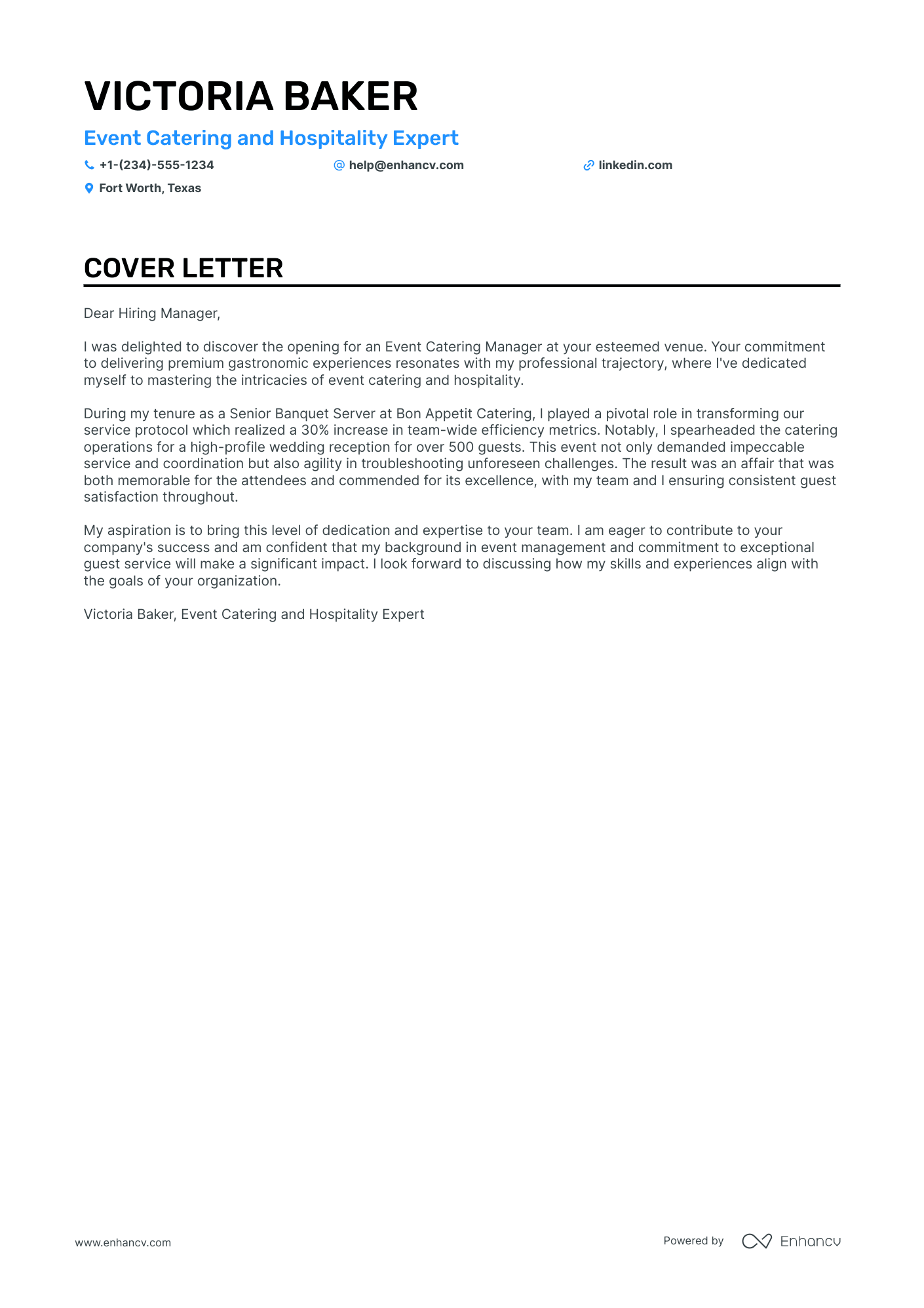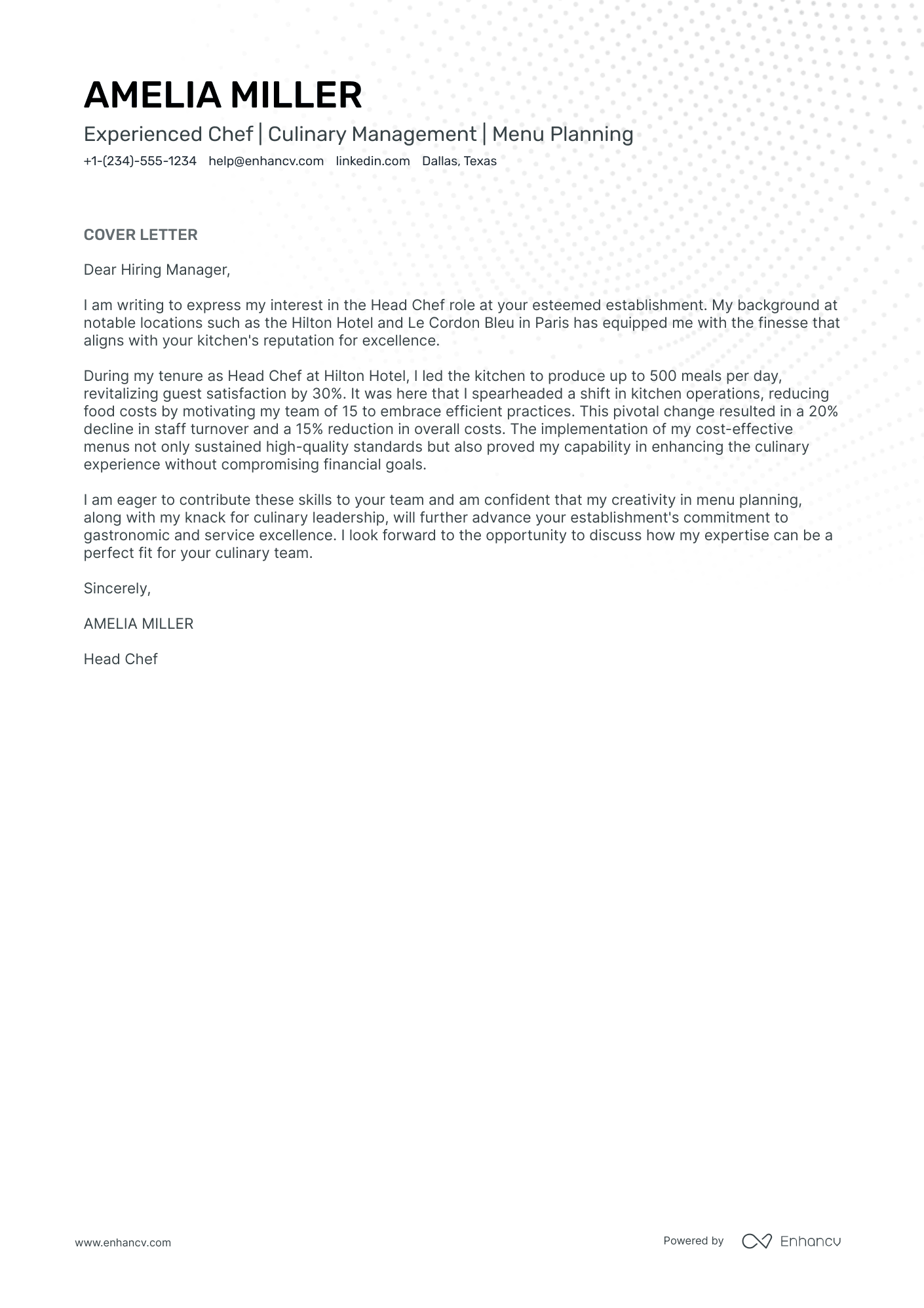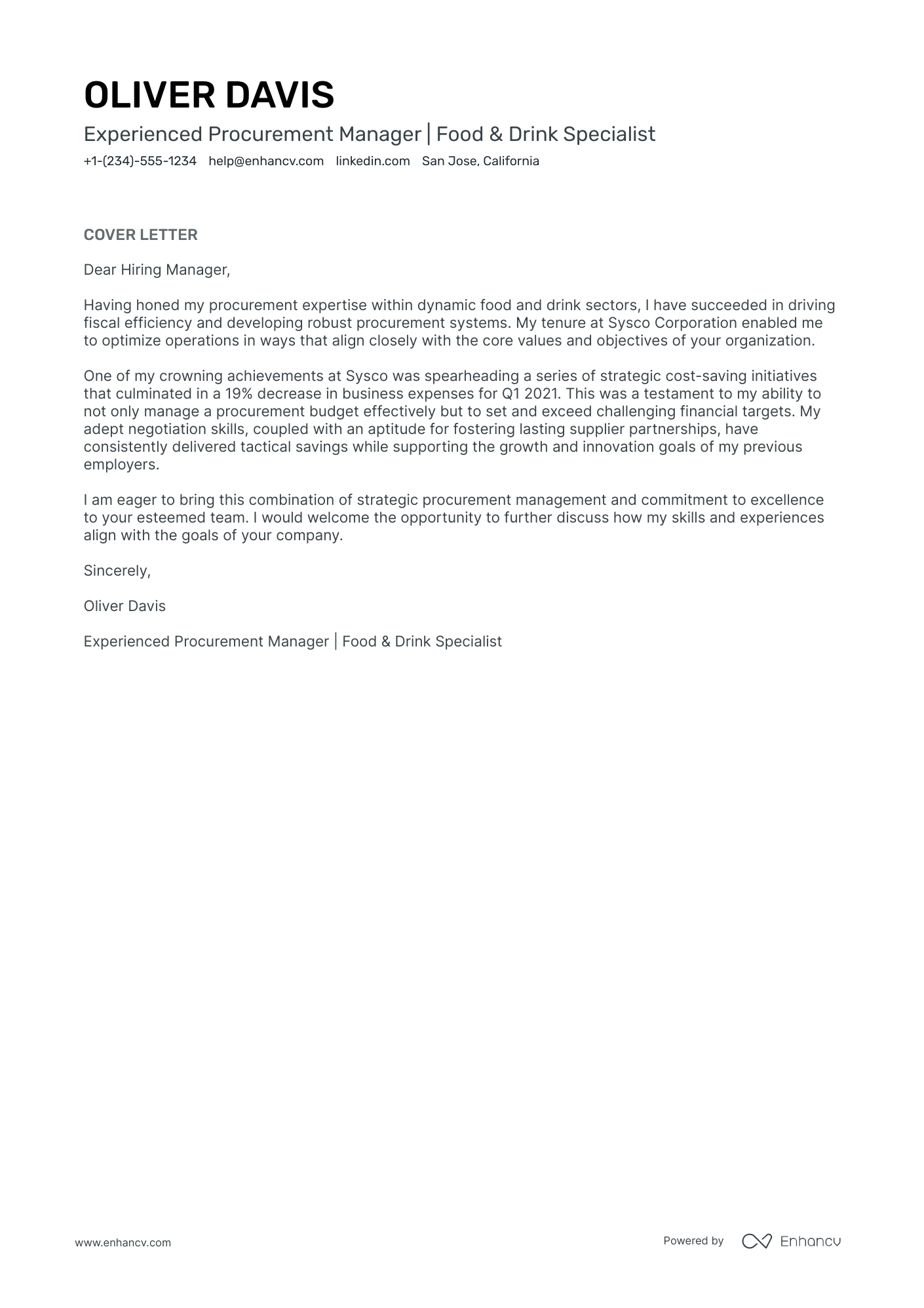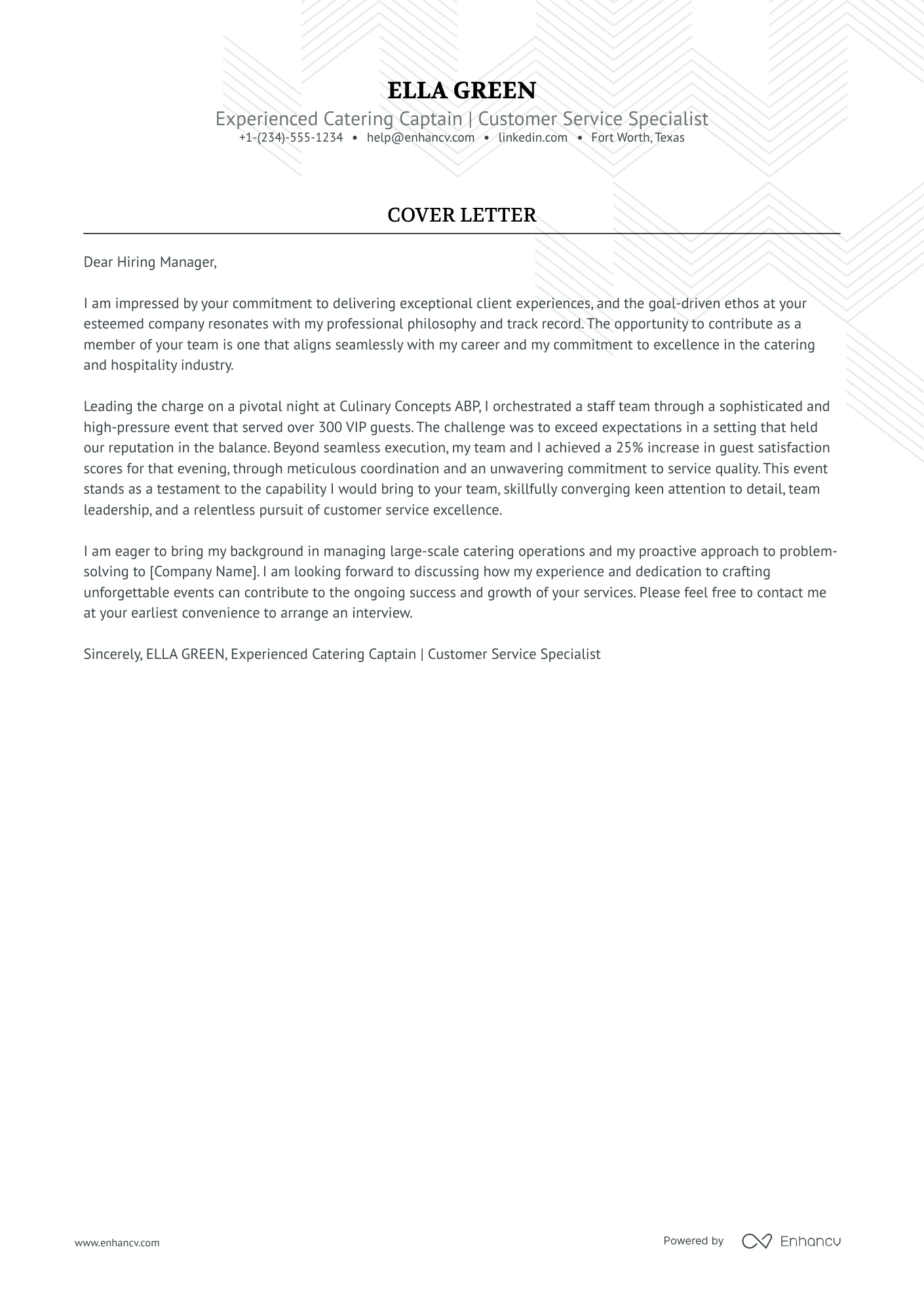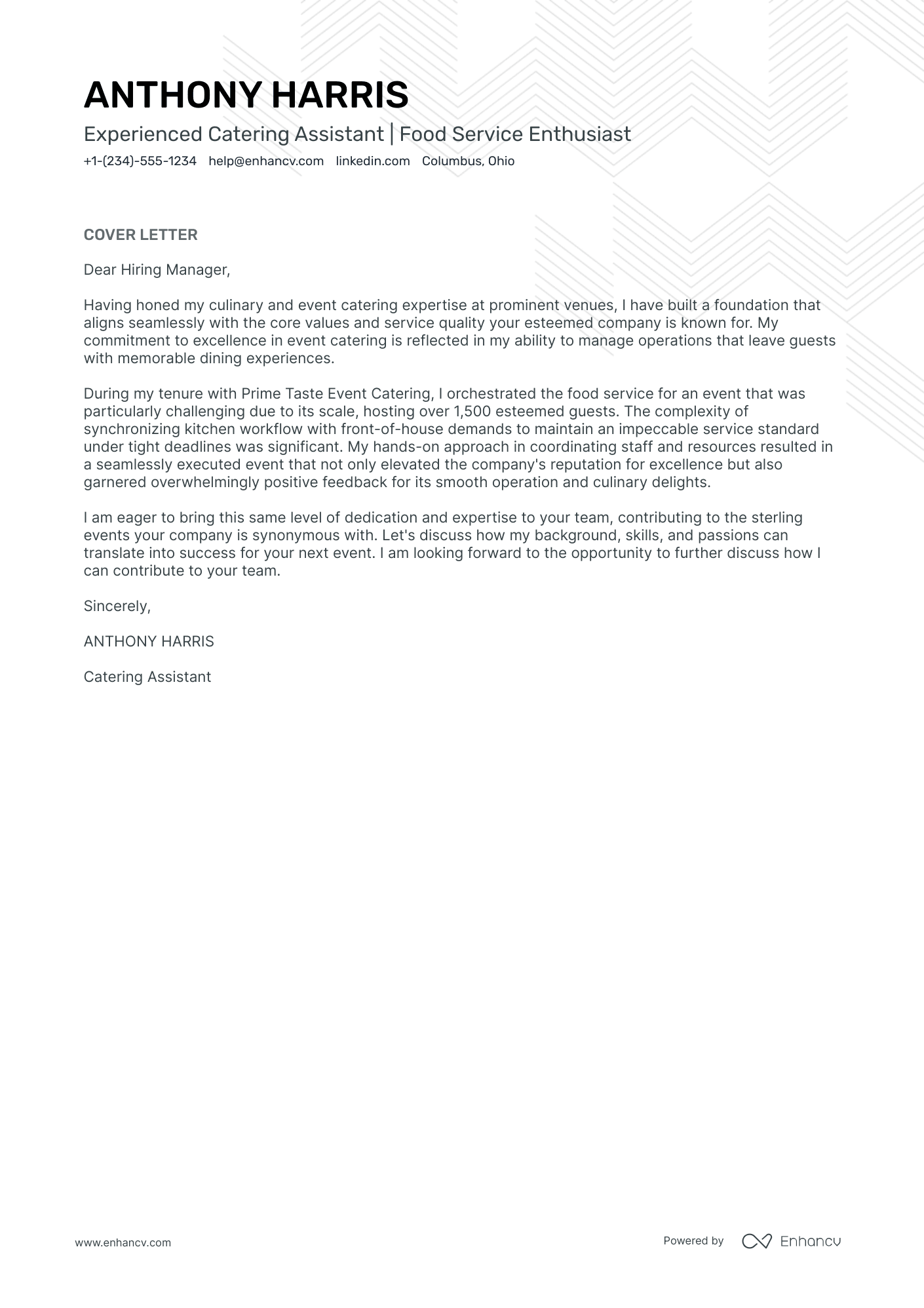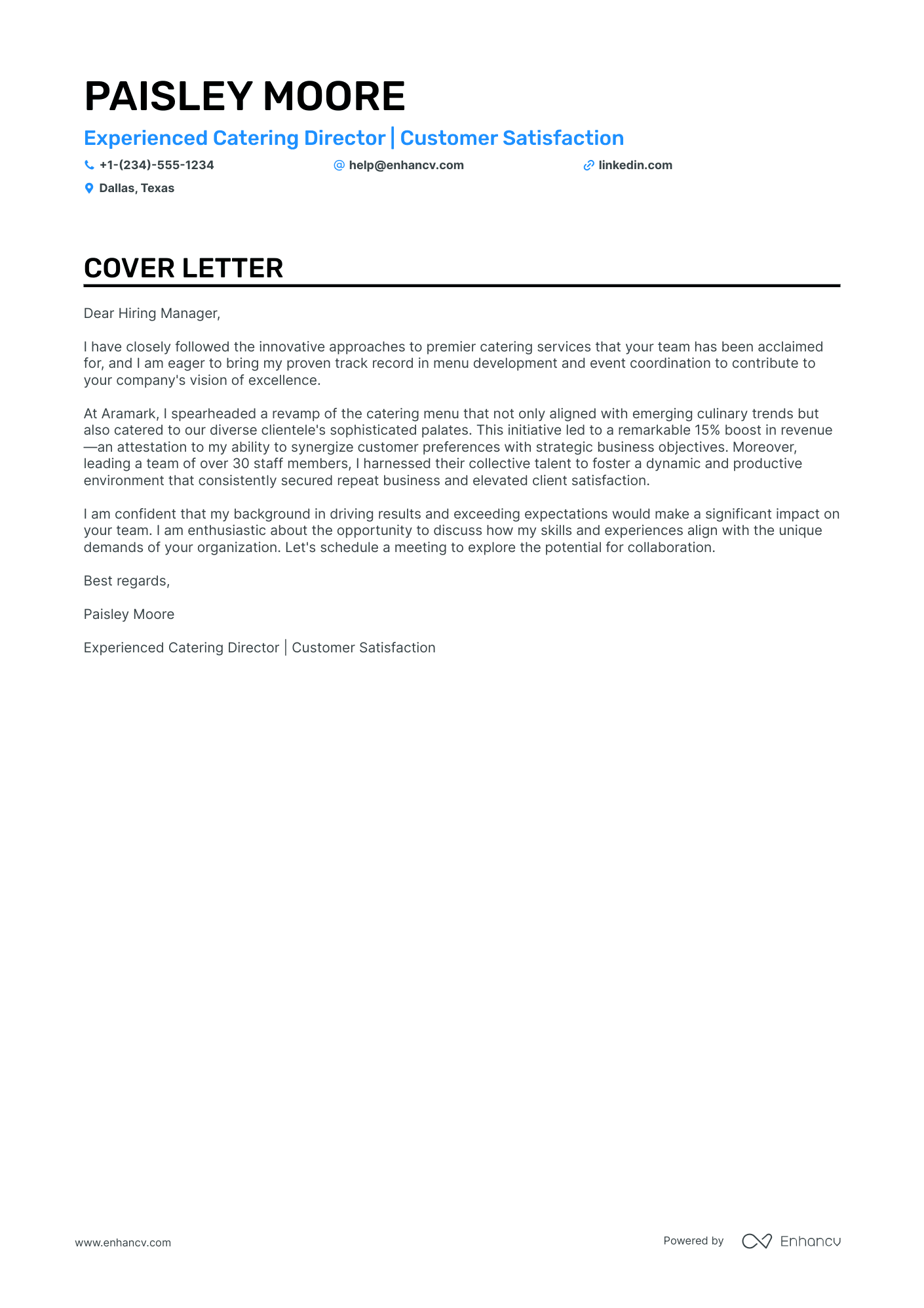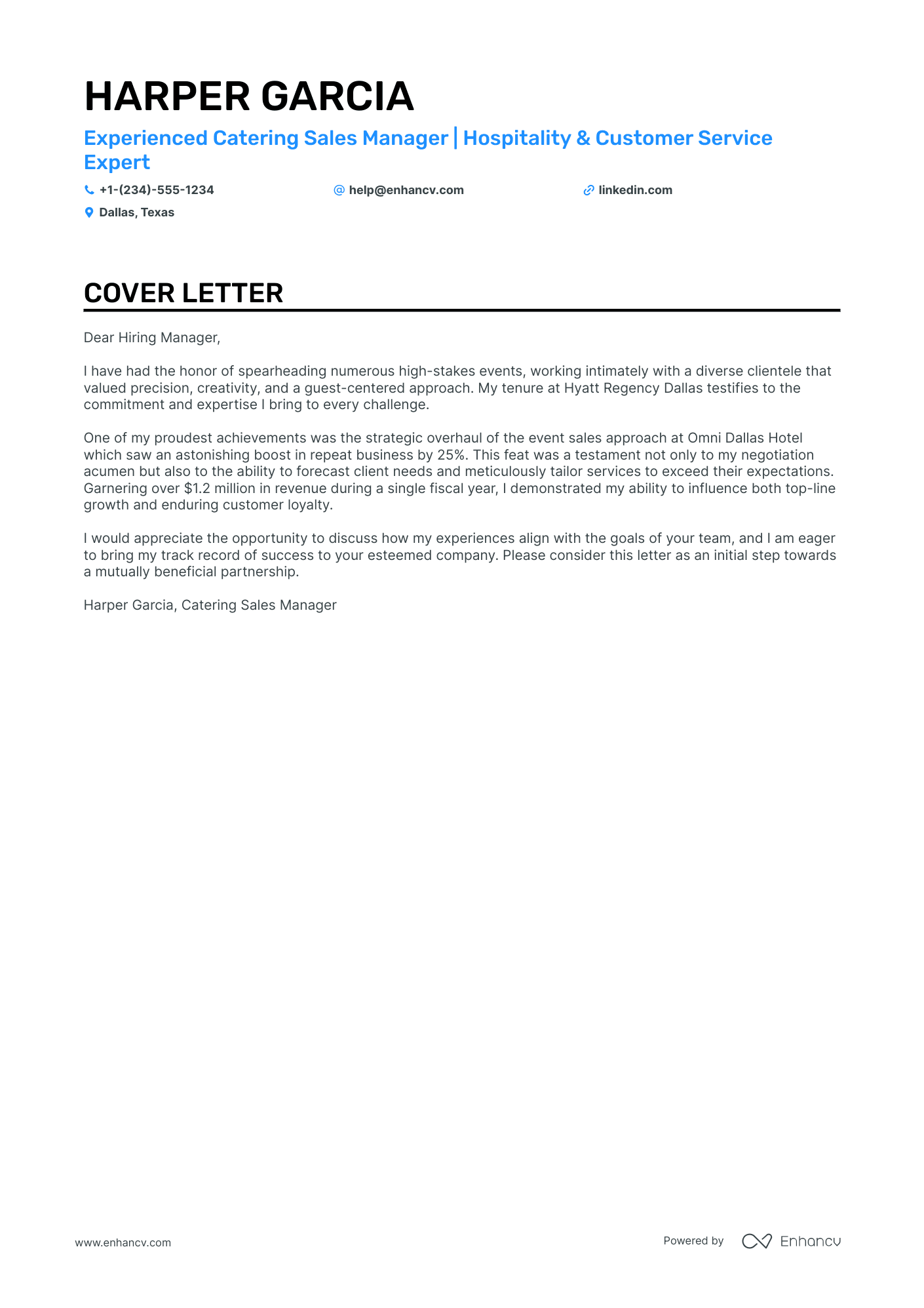You're ready to apply for a catering job, but there's one hurdle left: the dreaded cover letter. It's not just a repeat of your resume; it's your chance to showcase a standout achievement in a vivid story. The balance of formality with a fresh voice is tricky, and clichés? Avoid them like overcooked pasta. Remember, you've only got one page to make your mark. Let's crack the code to a compelling cover letter that leaves employers hungry for more.
- Writing the essential catering cover letter sections: balancing your professionalism and personality;
- Mixing storytelling, your unique skill set, and your greatest achievement;
- Providing relevant (and interesting) information with your catering cover letter, despite your lack of professional experience;
- Finding the perfect format for your[ catering cover letter, using templates from industry experts.
Leverage the power of Enhancv's AI: upload your resume and our platform will map out how your catering cover letter should look, in mere moments.
If the catering isn't exactly the one you're looking for we have a plethora of cover letter examples for jobs like this one:
Drop your resume here or choose a file.
PDF & DOCX only. Max 2MB file size.
Catering cover letter example
Lucas Rodriguez
Houston, Texas
+1-(234)-555-1234
help@enhancv.com
- Emphasizing relevant project management experience, such as the implementation of a new digital document control system, demonstrates the ability to lead and deliver successful initiatives, which is crucial for an Office Administrator role.
- Highlighting a key achievement (e.g., increasing document retrieval efficiency by 25%) provides concrete evidence of the candidate's impact in their previous position and showcases their potential value to the new employer.
- Mentioning specific technical skills (e.g., advanced proficiency in Microsoft Office) shows that the candidate possesses the necessary tools to perform daily administrative tasks effectively, signaling their readiness for the job requirements.
What should your catering cover letter look like - formatting and organizing your information
Have you ever wondered what are the must-have sections you need to include in your catering cover letter? Our builder sets those up for you with:
- Header - dedicated to your contact information, the role you're applying for, and the date (don't forget to include your name);
- Greeting and opening paragraph - to create a personalized and memorable experience for recruiters;
- Body paragraph - emphasizing your skill set and knowledge that aligns with the role and helps you to stand out;
- Closing paragraph - leaving a great impression and ending with an optional signature.
Use a cover letter template to discover the best formatting for your catering cover letter: that is single-spaced paragraphs and wrapping your content in a one-inch margin.
Ensure that both your resume and catering cover letter are in the same font. Stand apart from the crowd by using modern, yet simple fonts, like Chivo and Rubik, instead of the overused Arial and Times New Roman.
Did you know that the Applicant Tracker System (or ATS) won't be assessing your catering cover letter? Instead, submit your profile in PDF to recruiters to keep the same formatting and the design intact.
No time for a cover letter? Use our free cover letter generator and craft one effortlessly from your resume.
The top sections on a catering cover letter
- Header: The header should include your name, address, phone number, and email, ensuring that the recruiter knows who the letter is from and how to contact you. A professional header also sets a formal tone for the letter.
- Greeting: Address the letter to a specific individual, such as the head of the catering department or the hiring manager, to demonstrate that you have researched the company and are genuinely interested in the position.
- Introduction: In the introduction, briefly mention your interest in the catering industry and the specific role, highlighting your passion for hospitality, event coordination, or culinary arts.
- Body: Use this section to detail your relevant catering experience, such as event planning skills, food preparation expertise, or customer service accomplishments, showing the recruiter that you have the practical experience required for the role.
- Closing: End the letter with a call to action, expressing your eagerness to discuss how your skills and experiences align with the company's catering needs, and include a polite thank you to the recruiter for considering your application.
Key qualities recruiters search for in a candidate’s cover letter
- Experience in food preparation and service: Recruiters look for candidates who have prior experience with cooking, plating, and serving food, which is fundamental to catering events smoothly and professionally.
- Attention to detail: Catering requires meticulous attention to presentation, dietary requirements, and timing, ensuring every aspect of meal service is executed flawlessly.
- Strong organizational skills: Effective coordination of food, equipment, and staff is crucial in catering to manage multiple tasks simultaneously and ensure events run according to plan.
- Excellent customer service: Positive interaction with clients and guests is key in catering to create a welcoming environment and address any needs or concerns promptly.
- Flexibility and problem-solving: The dynamic nature of events means that caterers must be adaptable and capable of handling unexpected changes or issues with poise and creativity.
- Ability to work under pressure: Catering often involves tight deadlines and fast-paced environments, so being able to maintain high performance and a calm demeanor during stressful situations is highly valued.
What matters most when tailoring your catering cover letter salutation
Your catering cover letter greeting should feel welcoming to recruiters.
Use their first name (e.g. "Dear Marshall" or "Dear Sara"), if you've previously been in touch with the hiring manager and are on a more friendly basis.
If this is the first time you're contacting the recruiters, start your catering cover letter with:
- their last name (e.g. "Dear Ms. Ali" or "Dear Mr. Stevens") - look up who's the hiring manager for the role on social media or the company website;
- generalized greeting (e.g. "Dear HR Team") - just don't use "To whom it may concern" or "Dear Sir/Madam".
List of salutations you can use
- Dear Hiring Manager,
- Dear [Company Name] Recruiter,
- Dear [Recipient's Name],
- Dear [Recipient's Full Name],
- Dear [Mr./Ms./Dr.] [Last Name],
- Dear [Job Title] Search Committee,
The catering cover letter introduction: focusing on your unique value, with a creative twist
You are not the only one wondering how to start your catering cover letter. Those first two sentences introduce your profile and should be memorable.
No pressure.
When beginning your catering cover letter, immediately point out the unique value of working with you. In other words, what you promise to bring to the role by using your past track record of success.
Start your catering cover letter with a creative twist by telling a joke or stating something relatable. Select this type of introduction only if it aligns with the company culture.
What comes next: your catering cover letter middle paragraphs
In the next three to six paragraphs (or the body of your catering cover letter) you have to prove your unique value.
Most candidates tend to mess up at this stage. They tend to just copy-paste information from their resume.
That's one big no-no.
Remember that when writing your catering cover letter, it has to be personalized. And, your ultimate aim is to catch the recruiter's eye.
So, look back on key job requirements and write down a list that includes the ones you cover.
Next, select just one key achievement from your professional (or personal) history that meets those advert keywords.
Narrate a story around how you've grown your skill set and knowledge. Also, aim to show the unique understanding or soft skills you bring about, thanks to your past success.
A sincere and original way to end your catering cover letter
When writing their catering cover letter, candidates tend to use one of these phrases, "Sincerely yours" or "I look forward to hearing from you".
Both statements show good manners, but your cover letter should end in a more actionable manner.
Write about:
- how you see yourself growing in the role/organization;
- the benefits you would bring about (you'd impress even more with tangible metrics);
- the next steps in the process (provide your availability for interviews).
Which story should you tell in your catering cover letter when you have zero experience
Candidates, lacking professional experience in the field - this one is for you.
Your catering cover letter is an exercise of integrity, honesty, and, above all, spinning a positive narrative around your strengths.
And what better way to capture recruiters' attention than with your most job-relevant achievement (this could be from your internship or volunteering experience)?
Make sure to back up your success with transferrable skills that are relevant to the job (e.g. how your year, studying abroad, has taught you to be more motivated and handle multicultural environments).
Another safe card you can bet on is your career dream: in the body of your catering cover letter, go into the details of how your ambitions would help make the company you're applying for better.
Key takeaways
Creating your catering cover letter should be a personalized experience for the role and the recruiter, where you:
- Format your cover letter using the same ATS-friendly font (e.g. Railway) as you did for your resume;
- Greet recruiters, using their name, and follow up with two sentences to introduce yourself, your interest in the role, and to stand out;
- Map out one key success from your career (or life) that has taught you job-crucial skills;
- Substitute your lack of experience with an achievement from your internships, degrees, or volunteering gigs;
- End with a promise for your potential or your availability for an interview.
Catering cover letter examples
By Role
